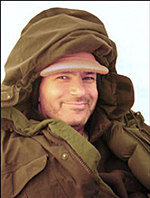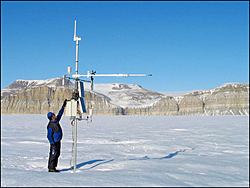
Striking images taken by NASA satellites offer further visual evidence that all is not as frozen as it once was at the ends of the Earth.
On Thursday, April 10, Abdalati, who is one of the world's pre-eminent experts on the study of global climate change, will present “Dramatic Changes in Earth's Polar Ice: Are We Waking Sleeping Giants?” at 7:30 p.m. in the Gore Recital Hall at the University of Delaware's Louise and David Roselle Center for the Arts.
Abdalati will highlight the critical role that ice plays in shaping our environment and what the loss of ice cover may mean for life on Earth. The presentation will be enhanced by stunning animations produced by NASA.
The lecture is the latest installment in UD's William S. Carlson International Polar Year Events--a year-long series of lectures, receptions, research seminars, art exhibits, and film showings that was launched in February to increase public awareness of the importance of the world's polar regions.
Carlson, UD's president from 1946-50, was an active polar explorer who, like Abdalati, studied glaciers in Greenland, the world's largest island. Carlson recounted his adventures in the book Greenland Lies North, which was published in 1940.
Abdalati conducts research on high-latitude glaciers and ice sheets using satellite and airborne instruments. His research has included nine field expeditions to remote regions of the Greenland Ice Sheet, which is a frozen reservoir for 8 percent of the fresh water on Earth, and ice caps in the Canadian Arctic.
As head of NASA's Cryospheric Sciences Branch, Abdalati leads a group of scientists who work with satellites and aircraft instruments to understand Earth's changing ice cover.Earth's cryosphere includes all of the ice in the sea and in freshwater lakes, rivers and streams, snow, glaciers, frozen ground and permafrost.
From 2000-04, Abdalati managed NASA's Cryospheric Sciences Program, overseeing NASA-funded research on glaciers, ice sheets, sea ice and polar climate. For much of the last 10 years, he has been heavily involved in the development of satellites specifically designed to observe changes in Earth's polar ice.
Abdalati has bachelor's and master's degrees in mechanical and aerospace engineering and received his doctorate in atmospheric and ocean sciences from the University of Colorado. Prior to his NASA career, he was an engineer in the aerospace industry.
Among his numerous awards and honors, Abdalati received the Presidential Early Career Award for Scientists and Engineers from the White House in 1999 and the NASA Exceptional Service Medal in 2004.
He also has made appearances on television and radio programs, including CNN, NBC and National Geographic.
The William S. Carlson International Polar Year Events are developed in partnership with the American Geographical Society of New York City and are officially sanctioned by the International Polar Year's International Programme Office in Cambridge, United Kingdom.

Abdalati's lecture will be sponsored by UD's College of Arts and Sciences, and Dean Tom Apple will deliver introductory remarks at the April 10 event.
The lecture is free and open to the public. Register online at
[www.udel.edu/research/ polar/registration.html]. A catered reception will be held after the lecture.
For more information about UD's research and outreach activities in the International Polar Year, please visit [www.udel.edu/research/polar].
Article by Tracey Bryant


